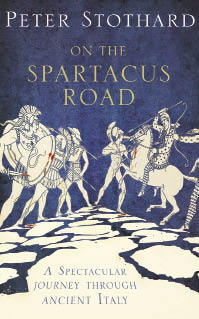The metaphors that come to us when we are sick, trapped in the no-man’s land bet- ween consciousness and oblivion, are often the most vivid of which our minds are capable.
The metaphors that come to us when we are sick, trapped in the no-man’s land bet- ween consciousness and oblivion, are often the most vivid of which our minds are capable. No wonder, then, once we are recovered, that the memory of them may prove impossible to banish. It is the measure of those that came to Peter Stothard when he was receiving treatement for what at the time appeared terminal cancer that they should have inspired this haunting, erudite and beautifully written book. Plenty of people, in the wake of a brush with death, have committed themselves to leading life to the full: by climbing Everest, perhaps, or sailing around the world. Has anyone other than Stothard, however, ever thought to go in search of Spartacus?
When history’s most famous gladiator escaped from his barracks in Capua, he and his companions took refuge on the heights of Mount Vesuvius, from where they then clambered down the rocks to ambush and wipe out a Roman army: the first of many startling victories. Stothard, amid the agonies of his sickbed, experienced his cancer as though it were just such a battle:
an assault of iron on the upholstery of my stomach, ribs grasped like ladders, alien objects left behind, broken glass, blunt knives, wave upon wave of pain, slow like an hour then blurred like a second, warfare in its unique and maddest way.
Language such as this brilliantly conveys the excruciating character of what Stothard endured; but it also begs an obvious question. Why did his subconscious go groping after a gladiator?
Written as a travelogue that criss- crosses Italy, On the Spartacus Road is as much an attempt to suggest an answer to this as it is a quest after Spartacus himself. There is something of the fourth canto of Childe Harold’s Pilgrimage about the resulting fusion of the picaresque and the personal, the literary and the introspective; but something too of that most un-Byronic writer, W. G. Sebald. Like Byron, Stothard is using the time-hallowed conventions of the Grand Tour to meditate upon his past, his present, and his very identity; as with Sebald, however, such meditations are invariably oblique.
The career of Spartacus, an ambiguous and shadowy one, is used throughout the book as a mirror held up both to Stothard’s experience of cancer, and to the patterns that constitute, or so he suggests, not only Roman civilisation, but the very fabric of human society itself. ‘We can see both the terrorisers from ancient Rome,’ he writes, ‘and those who were terrorised and how sometimes, very often, they were the same people.’ The question of who Spartacus might truly have been, whether an idealist or a warlord, a liberator or a thug, is never, in Stothard’s book, a merely antiquarian issue.
Not that he ever provides a definitive answer. As befits the Oxford classics scholar that he once was, Stothard is all too well aware just how light an imprint Spartacus has left behind. A recurrent companion on his trips is a Korean teacher, forever poring over her maps or poking around obscure huddles of ancient brickwork, and coming to the stern conclusion that gazeteers which claim to detail how the war might have been fought are not always to be trusted.
Neither, of course, are the historians and poets whose writings provide us with what outline of Spartacus’s career we do have, and who, in Stothard’s book, are sometimes no less companionable, and often infinitely better sketched, than the flesh-and-blood Italians hawking for business outside the Colosseum, or sat watching Juventus in their bars.
Horace, Plutarch and Pliny all join Stothard on the road, but his real affection, and the full reserves of his talent for characterisation, are lavished on dimmer figures from the classical pantheon: Symmachus and Statius, Florus and Frontinus. It’s a rare travel book that makes the pages of a Silver Age Latin poet seem a more attractive destination than Pompeii.
‘Like the best newspaper stories,’ Stothard acknowledges, ‘the gladiator is always a “story” ’. He speaks with the insight into how journalism functions that comes naturally to an erstwhile editor of The Times — nor, it seems, has Stothard’s more recent stewardship of the TLS served to atrophy his newspaperman’s instincts.
The life that he gives us of Spartacus is indeed, on one level, a ‘story’: one complete with breakouts, battles, and the pecking of eyeballs by hungry crows. Yet it is also, proudly and defiantly, the very opposite of journalism: a fusion of memoir, history and travelogue that is unlike any other book ever written about Spartacus, and all the more precious for being quite so unexpected.






Comments